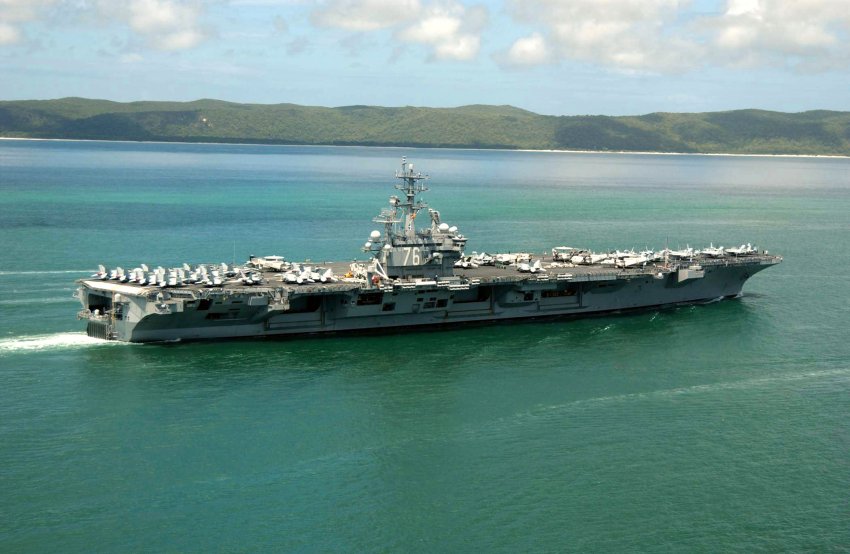
Queensland’s tourism boss Daniel Gschwind has welcomed the nuclear-powered aircraft carrier USS Ronald Reagan to Brisbane for the biannual US-Australia war games as a fantastic economic opportunity — a “cash splash for Queensland”.
“Friendly visitors, eager to explore, pent-up demand to have a bit of relaxation and see a bit more of Queensland … the old stereotypes don't apply here necessarily anymore”, he enthused on July 6.
The old stereotypes? He was likely referring to persistent allegations of sexual abuse that accompany visiting US navy personnel when they dock. Even within its own ranks, there has been a troubling rise in reported sexual assaults on women, with the US Defense Department confirming a 38% rise between 2016-18.
But the disembarkation of 4500 troops will be different this time, apparently, because their families will be joining the fun.
Gschwind said: “They use their Instagram accounts, they’ll use their social media, they'll brag to their friends, we hope, about the great experience they have here and that has an impact.”
He added that each sailor is expected to spend up to $1000 each.
Incredibly, the biannual Talisman Sabre war exercises are being sold to the public as “tourism”. We are told there is even a new craft beer — “Hop Gun” — on tap in Brisbane's South Bank tourist area.
It is difficult to promote military exercises with the world's main aggressor today, especially as Washington is threatening a new war in the Middle East.
Nonetheless, the Australian Defence Force is not shying away from the task: it has set up a “community information platform” and invited questions.
I did that, asking for the cost of the war games. At the time of publication I had yet to receive a reply.
In 2001, the month-long live-fire bombardment of a coastal wilderness was estimated to have cost $100 million.
The ABC reported that the USS Ronald Reagan — named after warmongering former US president Ronald Reagan, who was credited with expanding the Cold War and weapons production — cost $4.5 billion to build and $1 million a day to run.
That’s a lot of public money not being spent on public essentials and services.
This warship supports more than 60 combat aircraft and two nuclear reactors: wherever it goes, it invites danger, either by accident or design because these war machines are also likely to be carrying depleted uranium munitions.
Talisman Sabre is about showcasing the Australia-US alliance’s ability to work together — “interoperability” — by which is meant the seamless co-option of Australian forces into the US war machine.
These war games are Australia’s biggest yet: about 34,000 military personnel from both countries will take part. Canada, Japan, New Zealand and Britain have been invited to take part, while delegations from India and the Republic of Korea have been invited to observe.
Unsurprisingly, China has dispatched a ship, described in the media as a “spy ship”, to watch the month-long exercise from international waters. After all, the games are about asserting US-Australian dominance in the Asia-Pacific region.
Inside Australia, there has been and continues to be opposition to the wasteful exercise, as well as the use of national and marine parks up and down the coast of Queensland and parts of NSW.
Friends of the Earth (FoE) said that efforts to stop the use of non-defence sites for the combined air, sea and land exercises will continue as long as the military uses vulnerable Ramsar-listed wetland sites and feeding grounds for endangered species, including dugongs and green turtles.
The Department of Defence says that live ammunition will not be used, but FoE disputes this, saying live firing will take place at Shoalwater Bay, though outside the official war exercise dates.
The defence department has also said the war games are “not likely” to have a “significant” impact on the environment. But that is hard to believe, as Shoalwater Bay is Commonwealth Heritage-listed because of the ecological importance of its coastal and hinterland areas.
Talisman Sabre 2019 is the largest war exercise held so far. The US doesn’t need any practice fighting and neither does Australia: they have both been stuck in two protracted wars in the Middle East since 2001.
The climate emergency requires us to demilitarise, the opposite of where the Coalition government wants to take Australia.
If you want Canberra to prioritise aid and collaboration with our closest neighbours, support Green Left Weekly in its effort to link up those demanding an end to imperialist wars-with-no-end.